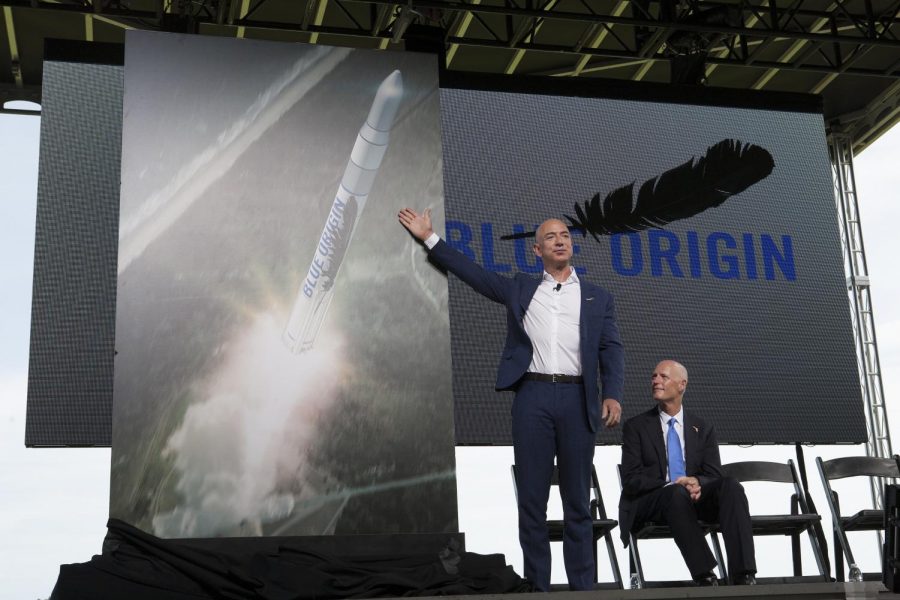Opinion | Do not wait for the technocratic utopia
Photo Courtesy of NASA/Kim Shiflett
Jeff Bezos, founder and CEO of Blue Origin, speaks at Cape Canaveral Air Force Station in Florida. Jeffrey Bezos tells others that Blue Origin will build rockets at Exploration Park at NASA’s Kennedy Space Center and launch them from SLC-36 at the Cape.
Aug 30, 2021
Anyone in the know on the techno-futuristic promises of billionaires and Silicon Valley God-complexes has heard of revolutionary changes to our society.
Life on Mars. Be chauffeured to the airport by driverless, artificially intelligent Teslas. Perform 100 blood tests with just a finger prick. Cure cancer with a pill.
Of course, there is a spectrum of believability and viability within the next several decades. If these technological advances come — the splendiferous advances from science fiction — they will not come in the pristine Star Trek-esque package we imagine. You cannot technocratically innovate your way out of capitalism. You cannot technologically innovate your way out of the profit motive of individuals using these new advances solely as a vehicle to gain more wealth.
Jeff Bezos alleges, from what can be gathered, two primary applications of the space frontier. 1) Ejecting garbage, pollution and polluting industries beyond Earth’s orbit; and 2) send workers to space as employees of company A, B or C to — safely assuming — mine for metals and minerals. The second is a sentiment fairly well known to have been stated by Neil DeGrasse Tyson: That the first trillionaire will likely gain wealth from controlling asteroid mining.
But the first position, I categorically reject as the obfuscation of a larger issue. It is not that disposal of human’s pollution out of earth’s orbit is a horrible idea — I do not personally know enough about the physics or economics of its viability.
Get The Daily Illini in your inbox!
What I hear when Jeff Bezos outlines this policy is an excuse to ignore climate change for another couple of decades, stop government intervention and halt any shadow of carbon pricing that may be lurking in the corner.
The opium high of anticipated technological advancement acts as a post hoc rationalization for incredibly expensive and damaging activities whose cost and externalities can be hand-waved away. “We’ll figure out a solution eventually,” the mantra seems to go.
We can limitlessly pollute because we will deal with said pollution at a later date with presently undiscovered technology. We can continue living and eating unhealthy because we will deal with the illness caused by such activity at a later date with different undiscovered technology.
I contend that the technocratic utopia — or at the very least the advances that might get us there — will not matter in any material way to the average member of the working class. Nevertheless, the ownership class can have a field day with their new toys.
For the executive with tens of millions of dollars and a fascination with the stars, private space flight might be a fun, dozen-minute mini vacation. But, for everyone else, techno-utopianism probably means artificial intelligent robots undercutting your salary and putting you out of a job.
Insulin as a treatment for diabetes is the product of scientific knowledge that has been around since the 1920s — not cutting edge by any means. But, because it saves lives, it sells for hundreds of dollars over its manufacturing cost. Now, imagine a technology that miraculously tells you if you have any of dozens of cancers all for the low production cost of around 10 dollars per test.
How much would this company charge a customer? Hundreds? Thousands of dollars per test? It sure beats a six or seven figure hospital bill if you delay a diagnosis and stage four comes quicker than expected.
I contend the best outcomes exist when societies function under the explicit presupposition that technology will fix none of our problems.
Instead of waiting for Jeff Bezos to turn earth into that of Pixar’s “Wall-E,” assume his solutions will never work and institute a carbon tax. Instead of waiting for Elon Musk to solve traffic with Tesla-exclusive hyperloops, invest in faster bus and train infrastructure. Instead of wishing and hoping for Elizabeth Holmes to diagnose all disease with the prick of a finger, invest in preventative care so the diagnosis never arrives.
The technocratic utopia will never come. But even if it does, it probably will not benefit the working class. But even if it does, until then, we must act as if it will never come.
Samuel is a senior in LAS.






